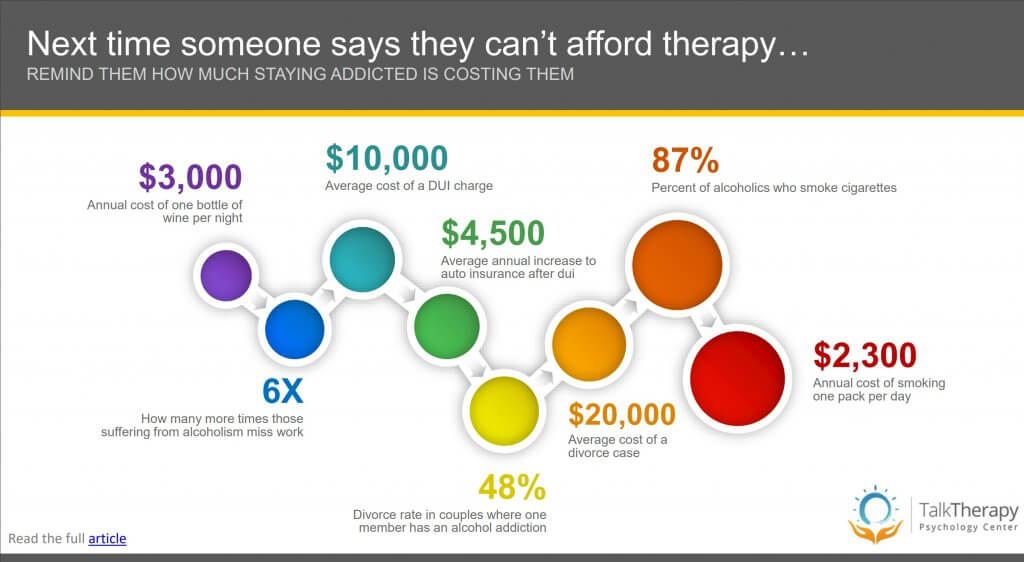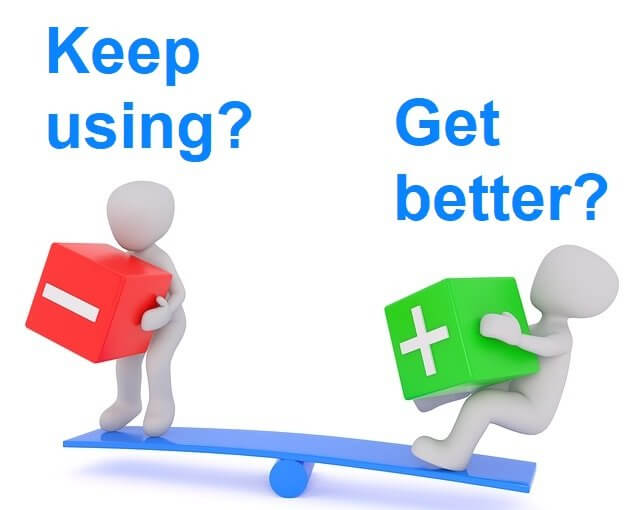Category: Article
Do you really worry about outpatient rehab costs?
We encourage our clients to shop around for not only the best therapist but also the best prices. This is especially true when your insurance does not cover an adequate portion of outpatient rehab costs. However, we are often surprised by people who do not pursue treatment altogether because they believe it is “too expensive”. Similarly, we are surprised when patients cut their treatment short because of financial considerations. Don’t get us wrong, we understand that getting treatment for substance abuse, whether it is through individual sessions or through intensive outpatient programs (IOP), can be expensive. But money should not be the sole consideration when foregoing treatment altogether or when stopping the therapy before enough positive changes have been made. The reason we say this is because we believe that returning to the addiction can be even more expensive, not only in intangible ways, but also in very real tangible costs.
Here are some tangible and intangible costs of continuing to use:
1. Risk of dying
First there is the possibility of dying. We are not sure this should be categorized as a tangible or an intangible cost but we certain believe it is an important one. It has been reported that excessive alcohol use kills about 88,000 people in the United States.
2. Cost to society
Substance abuse results in behaviors that cost the whole society quite a bit. Research indicates that the primary costs come from losses of productivity in the workplace, healthcare expenses from treating the substance abuse symptoms and outcomes, law enforcement and criminal justice costs, and motor vehicle related costs. In fact, it is estimated that alcohol use costs the US a staggering $200 Billion per year.
3. Cost of missing work
The most significant problems that companies experienced due to addiction are absences from the workplace, reduced productivity, missed deadlines, and increases healthcare costs.
4. Direct cost of spending on purchasing alcohol
We use alcohol as an example because it is easily researched, though you can substitute illegal substances in here as well. For instance, the costs of drinking a bottle of wine, or a case of beer, per night, comes out to approximately $3,00 per year.
5. Cost of car accidents and DUIs
Almost one third (29%) of all traffic-related deaths in the US are due to alcohol-impairment. In 2015, 10,265 people died in alcohol-impaired driving crashes.
There are obviously many more incidents that did not result in deaths. Every year, 708,000 persons are injured in alcohol related crashes; 74, 000 of those people suffer serious injuries.
One study suggests that there were as many as 111 million self-reported episodes of alcohol-impaired driving in the US in 2015. That year, nearly 1.1 million drivers were arrested for driving under the influence of alcohol or narcotics. This number has gone up to as much as 1.5 million arrests, per another study.
In the case where the driver is stopped for a DUI charge, the fines are significant. It is estimated that the total cost of a DUI that goes to trail is between $8k and $10k. That’s once you add legal fees, rehabilitation fees, increases to your car insurance, and other associated costs from the whole ordeal.
Keep in mind that the increase to your car insurance is not a one-time fee. It takes years of good behavior to get your premium back down again. On average, your car insurance will increase by $3,000 to $6,000 per year.
6. Cost of divorce
While divorce is common in the us, with a first-time divorce rate hovering around 40%, it is interesting to note that the rate is 50% when one spouse drinks heavily. That’s a 25% higher rate than the national average. With the average cost of a contested divorce ranging from $15K to $35K, this is a very real and substantial cost. Obviously, drinking is not the only reason people in this one study got a divorce, the increase in the statistic was significant.
7. Associated smoking expense
According to the NIH, between 80% and 95% of alcoholics smoke cigarettes. Based on CDC estimates, someone who smokes a pack a day spends roughly $2,300 per year.
8. Work absence
Absenteeism is estimated to be on average 6 times greater among alcoholics and alcohol abusers, than the general public. This not only impacts the employer, it also impacts the individual who is potentially hurting chances at a raise, or a promotion. Obviously, absenteeism can also get someone fired.
Additionally, in one study, workers with alcohol problems were nearly 3 times more likely to have injury-related absences, than the general public.
9. Other costs
There are obviously many other general costs that could be considered. For incidents that result in some injury, there are hospital and medical bills to cover. There are also unintentional injuries that may result from being under the influence.
Apart from medical bills, there are other unpaid bills that can add up, as people forego tending to their responsibilities as a result of their addiction.
The list goes on and on. So, now, with those costs in mind, let’s look at what treatment may cost you.
In general, there are a few paths that one can take when seeking treatment for substance abuse. There are inpatient programs, outpatient rehab programs, such as Intensive Outpatient Programs (IOP), partial hospitalization, and outpatient individual sessions.
Cost of Inpatient Care
Inpatient rehab will cost you anywhere between a few thousand dollars to upwards of $60,000 for a month of treatment. There is such wide range largely due to location, the amount of services provided, and the center’s reputation. A basic, low-cost 30-day residential rehab will be in the range of $2 to $7k. your standard residential inpatient treatment will go up from there all the way to $20,000 per month. Above that amount, you enter into the world of premium, luxury, and so-called executive residential inpatient rehab centers. Such options will offer a fast range of amenities on premises, several therapy alternatives, and the highest quality of accommodations.
Costs of Outpatient Care
Intensive outpatient program (IOP) participation will range between a few thousand and $10,000. Such programs can be very effective while also allowing you to continuing carrying on with your life’s responsibilities, including work, and family care.
It should be noted that both inpatient and outpatient rehab centers can take insurance. You should consult your insurance or talk to the treatment center you are considering to understand what your insurance covers.
Cost of Detox Centers
Sometimes, detox is first required before therapists can start working with you. Often, this is in response to a significantly compromised individual who requires some return to normalcy before pursuing treatment or returning to their daily lives. Detox treatment centers will typically charge by the day and the range can be anywhere between a few hundred dollars to $1,500 per day. Again, the location, reputation, and amenities of the facility play a big role in the big range in costs.
As always, we encourage people to consider their options. Sometimes, a few individual sessions is all you need to get back to balance. Other times, a more intensive treatment option may be warranty. However, we would like to encourage all those who are dealing with substance use issues to seek help. Even if you pursue a free, community-based solution, it is better than doing nothing. It will also get you moving into the right direction.
If you have any questions about the above, or would like to understand your options for treatment, please don’t hesitate to reach out to us.
All the best.
858 205-2490
Download our free eBook to learn everything there is to know about Intensive Outpatient Programs!
Resources
https://www.cdc.gov/features/costsofdrinking/index.html
https://www.cdc.gov/motorvehiclesafety/impaired_driving/impaired-drv_factsheet.html
http://www.faddintl.org/pr/p5.html
https://www.addiction.com/3003/will-alcohol-abuse-lead-divorce/
http://info.legalzoom.com/average-cost-divorce-20103.html
https://www.ncadd.org/about-addiction/addiction-update/drugs-and-alcohol-in-the-workplace
https://pubs.niaaa.nih.gov/publications/aa39.htm
https://www.cdc.gov/tobacco/data_statistics/fact_sheets/economics/econ_facts/index.htm
11 Tips for Finding a Good Psychologist
There are many things to consider when looking for an individual therapist or a mental health treatment center. Yet, many people don’t take any time to do the necessary research. The result of choosing haphazardly is that you may find someone who is not a good fit, or doesn’t have the necessary experience to truly help you. You wind up wasting your time, money, and energy and postponing your opportunity to get better.
Spending even a few minutes to think through your selection criteria will help greatly in finding the right therapist. Here are some considerations:
1. Therapist experience and specialty. Look for programs that are facilitated by qualified individuals with past experience in the particular area of treatment. If you are battling with addiction, you don’t want to go to a generalist. You want to speak with someone who has worked through the particular challenges of that condition. If you are an adolescent, you don’t want to go to someone who has no experience working with people in your age group.
2. Testimonials from past clients. It is important to see client feedback, even if published anonymously. Given HIPAA restrictions, it is very difficult to publish full names of clients. So, you will have to trust the anonymous testimonials that are published by the therapist or center. Do they have testimonials from clients who are working through a similar situation as you? Do they have both older and more recent testimonials published on the site?
3. If joining a group therapy setting, like an Intensive Outpatient Program (IOP), group meeting attendance levels are important. Look for a program that has enough participants to remain intimate and beneficial, with good group conversations. Some group-oriented programs will just pile people into the room for financial reasons, or because they don’t have enough of a specialization. While there is no ideal group size, we tend to find that smaller groups are more beneficial for our clients.
4. Availability of free consultation and initial group meeting participation. while a free consultation is not always necessary, it’s good to know that you have the option to “kick the tires” so to speak. Note that attending a free group session may not be appropriate. Typically, a center will want to meet you in private first to assess your situation and fit. But after this is done, it’s possible to ask to sit in on a group session before officially joining.
5. It is a two-way street. It is good when a center asks pointed questions to assess client fit. This shows that the program administrators care about the impact that a new patient will have on their existing patient base. Sometimes, the sign of a quality center is one that actually turns potential clients away. Of course, if the center is not able to take you, for whatever reason, they should at least give you a solid referral to another center or individual therapist.
6. Availability of therapists outside of formal sessions. Some situations call for quick access to a therapist to discuss an urgent matter. Depending on the condition, people will often have relapses or will have situational emergencies. Sometimes, you wan’t wait until your weekly appointment. It’s good to have access to a treatment center or therapist who can take the occasional emergency call. This sort of availability also goes a long way towards strengthening the bond between patient and therapist and ensuring the therapist is truly vested in your well-being.
7. Treatment planning sessions and the creation of a personalized treatment plan. There are various things that can go into a plan and this will be discussed in another article. What is important is that the treatment center or psychologist takes the time, up front, to understand your situation, your background, and your objectives. Together, then, you should work towards creating meaningful milestones, setting expectations for what progress looks like, and discussing the course of care.
8. Cost considerations. Find a therapist or program that takes advantage of your health benefits and fits in your budget. But also realize that therapy is not free. How much you want to invest into your therapist is a direct indication of how serious you are about getting better. You are about to invest a lot of your time and energy into overcoming whatever issue you are working through. Give the therapists the respect they deserve and invest in them so that they may invest in you.
9. Availability of external resources. If the condition requires external support, it is good to find a therapist who is networked and has access to outside groups, adjunctive therapies, etc. Often times, therapy is not a one-trick pony. A good psychologist or treatment center will look for the right combination of internal and external resources to help you. Additionally, when it comes time for discharge, it’s good to know a therapist that can align you with external and long-term resources to help you on your on-going journey to mental wellness.
10. Track record. While it is hard to find accurate information about how effective a therapist is, reviewing testimonials can help. If you are joining a group like an IOP, talk to the other participants and see how they are improving. It’s important to note, as well, that the entire health field is quickly moving to a demonstrated efficacy of care model. More and more, doctors and therapists of all areas will be judged and compensated by insurances on the results they deliver for their clients.
11. Rapport. During the initial consultation, it is important to establish some rapport with the therapist. Note that this doesn’t necessarily mean you have to find a therapist who validates your every statement. At times, therapy requires tough conversations and helping you look at your deepest thoughts and feelings. Going through this journey with someone you feel safe with is key.
Selecting a psychologist or a psychology treatment center should not be done without some research. Some people just choose the first therapist that shows up on their insurance company’s in-network list. Spending time to assess some of the above criteria also takes away some of the emotional resistance that some people have towards seeking help. By focusing on the research itself, the exercise becomes less emotional and more analytical. People often hesitate to even pick up the phone. This way, the first call becomes less about “I need help and I don’t know what to do” and more about “help me understand why you will be a good therapist to help me through this period of time in my life.”
All the best.

858 205-2490
Tips for Managing Addiction During the Holidays
We see an increase in addiction challenges during the holidays. Let’s talk about what you can do to increase your chances of staying sober, or to ensure your moderation plan stays on track.
- WHO: Stay vigilant about who you hang out with. Are there people that tempt you into bad behaviors? Are there key relationships that are particular triggers for you?
- WHEN: There are certain days of the week when people like to let loose. Friday evening is the obvious one. People are done with work and just want to relax and let go. If there is a particularly vulnerable day of the week for you, plan healthy alternatives during those days. How about making Friday night your netflix night? Perhaps the holidays are particularly difficult, or a key anniversary. Plan ahead of time before that day comes.
- WHERE: Just like the day of the week, there is also a place that you go where all bets are off. During the holidays, people make trips back home, or to that certain friend’s house. Plan ahead of time. If at all possible, avoid trigger places or places that give you access to those things you are trying to avoid. Sometimes, however, it is inevitable. That annual trip home with the family can often be a tough environment to manage. Create a supportive friend circle and stay in touch with them while on that trip. Have them check in on you. Ask for help from then to hold you accountable ahead of time.
- WHAT: Think of what you can do ahead of time to avoid temptations. Take a favorite book. Find a new hobby that can keep you engaged. If you are attached to your cellphone, download a new app that can create a healthy distraction. Plan your days ahead of time so that you can have healthy activities timed properly. Maybe going home for the holidays is a trigger for you. But how about visiting some childhood spot like a favorite movie theater, or a local attraction? Spend time around places that you associate with loving and caring moments in your life.
We hope everyone enjoys the holidays and remind you to plan ahead, be safe, and keep your commitments to recovery. As always, if you need some expert advice, you may reach out to us for consultation. We find group therapy, such as our Intensive Outpatient Program (IOP) to be particularly effective during this period as many other participants are dealing with similar challenges and you have get great support and ideas from each other.
All the best.
Rising above the darkness during recovery
At times, Talk Therapy Psychology Center hosts articles and important announcements from our partners and clients. Here is a meaningful post from one of our regular contributors, Joe Cervantes:
“Addiction and recovery often come with some dark times. Maybe you’re depressed and using drugs or alcohol to self-medicate. Or maybe you’ve stopped drinking or using drugs and you are now feeling the weight of the world on your shoulders.
Whether you’re currently struggling with an addiction or in recovery it’s important to remember that it is during these dark times that we grow, learn, and evolve as human beings. It’s in these moments of seemingly endless discomfort and pain that our character is shaped the most and we are provided with a powerful opportunity to get back up on our feet and come out a better person. But as anyone who has experienced darkness knows this is easier said than done.
Here are a few important things to remember whenever you are going through a dark period in your life.
The Darkness is Your Teacher
Ask any successful person and they will tell you the same thing. By overcoming adversity and facing our challenges head on, we become stronger and more resilient so we can take on more complex challenges later in life. We don’t grow as much when we are safe and comfortable, and everything is going our way.
The Dark Thoughts are Not Real
Dark times are often associated with a healthy dose of negative thoughts. But more often than not, these thoughts are not an accurate indicator of your reality. When we are depressed or down, we catastrophize our situation and look for opportunities to bask in our sadness, rather than pick ourselves up. Do not judge or condemn yourself for having negative thoughts. We all have them. Just remind yourself any time you’re feeling down that your thoughts might be trying to play tricks on you.
Darkness Doesn’t Like the Light
Surround yourself with positive people who will help you gain perspective and support you emotionally through your dark times. Stay away from complainers, people who just want to commiserate, people who keep you shackled to your past, and even people who “feel sorry” for you. Instead spend your time with uplifting and cheerful people who will encourage you to look past the darkness, remind you of your strengths, and help you focus on your positive character traits.
Darkness Feeds on Inactivity and Inaction
The best thing you can do during times of darkness is simply move. Force yourself to do something physical or mentally stimulating, even if it’s just a short walk around the block or finishing a puzzle. Not only will your body immediately begin to produce darkness-crushing endorphin but you will also become distracted by your positive activities. Keep moving and you will begin to see progress and momentum build in your life, which will ultimately begin to replace the darkness with the light.
There is Nothing Wrong with You
There is a major stigma around depression in our society that is associated with weakness, mental instability, and one’s overall inability to cope. Although depression can certainly be debilitating, it does not speak to our ability to learn new coping skills or demonstrate strength over our adversities. Everyone feels darkness in their lives to differing degrees. It’s part of the human condition. It’s not the darkness that defines us, but rather it is the manner in which we approach it that matters the most.
Love Yourself Unconditionally Through the Dark Times
We tend to turn against ourselves during tough times and become our own worst enemy but it is in these times of darkness that we need to learn how to become our own best friends. If you’re having a difficult time you need some support. Do not hesitate to turn to family, friends or professionals for the needed support. This is one way you can practice being your own best friend.
And no matter how bad the pain, the sadness, or even the most debilitating depression, the most important thing to remember is that no matter how bad things get, the darkness never lasts.”
About the Author:
Joseph Cervantes is an advocate for the de-stigmatizing of addiction and for the development of progressive treatment approaches. As a writer in the addiction treatment space and former community organizer he has had the opportunity to work with hundreds of individuals struggling with various addictions and mental health issues. Having completed several IOP and inpatient programs himself over the past 20 years, he offers a unique perspective into the treatment and recovery experience through both a “patient” and “practitioner” lens.
At the Talk Therapy Psychology Center, we strive to give you the right tools to cope, the skills to deal with setbacks, and the ability to believe in, and rely on your own strengths. Sign up now for private, one-on-one sessions, or join our popular Intensive Outpatient Program (IOP).
(858) 205-2490
www.talktherapycenter.com
Resentment
What is resentment? It is a feeling we get when we believe someone has wronged us, has taken something from us without our permission, has said hurtful things, has made decisions that have negatively impacted us, or has somehow failed our expectations. The feeling generally develops over time after repeatedly being exposed to the situation.
Resentment internally is like poison running through our veins. It leads to unhappiness, disrupted sleep, over-analyzing, desire to be vengeful, and aggressive or passive-aggressive behaviors. Actions or interactions that are fueled by resentment generally tend to lead to destruction, especially destruction of relationships.
How do you let go of resentment? The first step is willingness. Often, we are too attached to our resentment, making it difficult to let go. We draw a certain energy from resentful thoughts giving us the perception that we are in the right and justified. Letting go of resentment might feel as if you are letting go of being right, which is not really the case. Furthermore, how important is it for you to be right? Take a situation that is causing you to be resentful and apply the following few steps:
- Be willing to let go of resentment, the attachment to it, and the energy that it brings.
- Let go of the need to be right even if you believe you are in the right.
- Try to see your role in the situation. This realization can lead to feeling empowered and in-charge of the situation.
- Kick into action and address the situation in a healthy and assertive manner if possible.
- Remind yourself that your resentment hurts you and no one else.
About the author: Dr. Seda Gragossian is the Clinical Director at the Talk Therapy Psychology Center in San Diego, where she helps people work through mental health issues such as anxiety, depression, trauma, addiction, and many others. Talk Therapy runs individual, group therapy, and intensive outpatient programs (IOP).
Dr. Seda Gragossian, PhD, PSY 24901
(858) 205-2490
Clinical Director
Talk Therapy Psychology Center
5935 Cornerstone Ct W, Ste 125
San Diego, CA, 92121
www.talktherapycenter.com









